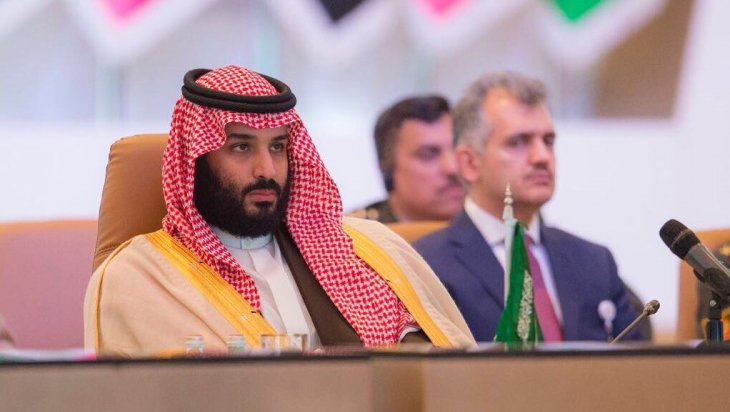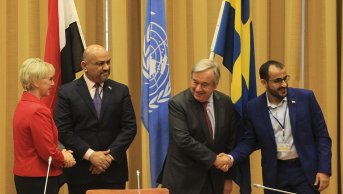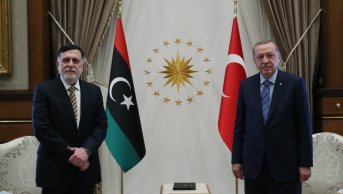Saudi Arabia’s Deceitful Game in Yemen

The first three months of 2020 has witnessed multiple military escalations that pose a threat to the lives of millions and to the efforts towards a peaceful solution for the five years of conflict in Yemen. The latest escalated hostilities between Houthis and the legitimate government supported by the Kingdom of Saudi Arabia (KSA)-led Coalition forces in Al Jawf, Marib, and Sana’a governorates caused hundreds of civilian casualties and a mass displacement of around 35,000 people in affected areas.
Recently, on March 28, Saudi Arabia's air defenses intercepted two ballistic missiles over the kingdom's capital, Riyadh, and the southern city of Jizan. Saudi Military spokesman Turki al-Malki blamed the attacks on Yemen's Houthi rebels. Likewise, the military spokesman for Yemen's Houthis, Yahya Sarea, confirmed the attacks and warned of further "painful operations" against Saudi Arabia if aggression against Yemen continues.
Two days later, the Saudi-led coalition carried out several air strikes on the capital Sana’a, targeting a number of sensitive sites including the presidential palace compound, a school, a military training site and an air base close to Sana’a airport, killing one person and dozens of horses.
Surprisingly, The Wall Street Journal reported on the same day of the air strikes that Saudi’s ambassador to Yemen, Mohammed al-Jaber, said that “Saudi Arabia is in daily talks with Iran-aligned Houthi insurgents in Yemen and has invited Houthi representatives and the internationally recognized government in Yemen to peace talks in the kingdom”. Although how the Houthis are going to respond this call is not known, this Saudi initiative suggests that the Houthis are probably winning, especially after their recent significant advances on the ground in Al-Jawf province along the Saudi border.
However, throughout five years of war in Yemen, it is clearly understood that any violent actions on the ground are meant to reach a negotiated settlement between involved parties just like what happened in Hodeidah where the violent actions at the end of 2018 partially stopped after signing of the fragile Stockholm Agreement between Houthis and the legitimate government. In addition, the military escalation at the end of 2019 in Aden between the legitimate government and the Southern Transitional Council (STC), which are both considered allies of the Saudi-led coalition, stopped after signing the Riyadh Agreement under Saudi auspices. Both agreements are not implemented yet and might not be applied at all, if the current conditions remain.
Saudi’s Big Failure
Saudi Arabia’s inability to resolve either the fighting among its different Yemeni allies or against Houthis becomes quite obvious to its local and international allies. Its chain failures of restoring the legitimate government to power and implementing the mentioned agreements, combined with the high cost of the Houthis’ September 2019 drone attacks on Saudi Arabia’s Aramco oil plant and the Houthis’ new military leverage in Al-Jawf, could be used in negotiations to pressure the Saudis to diminish their support to the legitimate and internationally recognized government in exchange for restoring calm on its borders with Yemen.
And while the kingdom has many reasons for wanting to wrap up its involvement in the war, it does not have a coherent political and military exit strategy. Consequently, the fast-changing situation in Yemen has pushed Saudi Arabia to alter its approach to the war in Yemen even if it must abandon its honest allies.
Intentional Downgrading of Power
Officials from Saudi Arabia and Houthi rebels have confirmed in many occasions that they are holding indirect talks to end the devastating five-year war in Yemen. The negotiations are taking place through Oman as the mediator, a Gulf Arab country that borders both Yemen and Saudi Arabia. According to AP, the Oman-mediated talks began in September 2019 after a Houthi-claimed drone attacks on Saudi Arabia. The talks mainly focus, as claimed by Abu Bakr al-Qirbi, a former Yemeni foreign minister, on dismantling the Houthis' ballistic and drone capabilities and the kingdom's border security.
By the middle of February 2020, Saudi’s Ambassador to Germany, now Minister of Foreign Affairs, Prince Faisal bin Farhan Al-Saud, said about the Munich Security Conference that they “have a back channel peace talks with Houthi rebels and it’s not yet ready to move to the highest level. It’s making progress. We have seen some deterioration recently, but we are committed to moving it forward”. Prince Faisal also confirmed that Saudi would continue to respond to attacks, but that the recent Houthi assaults were not yet at the point that they were endangering the back-channel talks.
Additionally, the Houthis frequently offered to stop launching attacks on Saudi targets if the Saudi-led coalition fighting the Yemeni rebels ended its air strikes. In November 2019, Houthi officials confirmed that “There have been talks between Saudi Arabia and AnsarAllah (the Houthis) in Oman over opening Sana’a airport and lifting the blockade on Yemen”.
In contrast, the absence of a legitimate and internationally recognized Yemeni government in these talks raises a question of trust with Saudi Arabia and its way of handling things on the ground. Yemen’s Deputy Prime Minister Abdulaziz Gubari said on many occasions that “his government is not aware of the ongoing talks between the Houthis and Saudi Arabia”, warning Saudi Arabia not to sign any agreement that would keep the capital Sana’a and other provinces under the control of the Houthis.
Saudis may succeed in calming down the battles on their southern borders for a few months but the latest drone and ballistic missile attacks on Riyadh proves their strategy wrong. And while the Saudi-led air strikes stopped targeting Houthis for months, the Houthis are still targeting civilians in many cities and battles are still continuing on several local fronts. It appears that Houthis are the winners of those secret talks and could win the open ones, if Saudi Arabia continues to side-line Hadi’s legitimate government.
The Unstable History of Alliance with Saudi Arabia
Over the past years, alliances between Saudi Arabia and the United Arab Emirates (UAE) with the legitimate government have fractured. In southern Yemen, Saudi Arabia came to support the Yemeni government led by President Abdu Rabbu Mansour Hadi, but the UAE backs STC, causing many armed clashes in the area. In August 2019, clashes occurred between the Yemeni government and the STC forces, with the UAE carrying out airstrikes in support of the STC forces that seized the Presidential Palace and public institutions in Aden leading to weeks of infighting before a truce was declared.
The UAE has been accused many times by Yemen's Hadi government of attempting to occupy the south of the country, where it has established strong military bases and trained thousands of fighters such as the Security Belt Forces, Shabwani and Hadrami Elite Forces, Salafi Amalqa and Abu Al-Abbas Brigades. In 2018, the government accused the UAE of seizing Yemen's Socotra Island when it unloaded unnecessary tanks and troops in the island that did not witness any fighting since the beginning of the war in 2015.
Briefly, the UAE has used its leading position in Riyadh's anti-Houthi coalition as justification to expand its influence in Yemen's south, though its backing of southern separatists and independent militias (STC) threatens Saudi Arabia's attempts to reinforce the Hadi government's unified legitimacy over Yemen. After all, despite the UAE's blatant moves to occupy southern Yemen, Riyadh has avoided directly criticizing them and kept diminishing Hadi’s government authority on the ground. All these unpleasant actions are weakening and distracting the government from doing its work, leaving civilians to suffer from a lack of basic services, economic crisis, abusive local security forces, and broken governance, health, education, and judicial systems.
Mohammed Alragawi, Journalist









